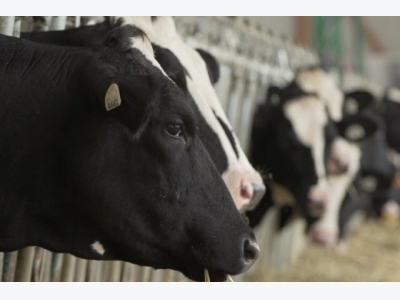Benefits of vitamin B for dairy cows

Milk producers all over the world are always looking for ways to increase feed intake pre partum, decrease metabolic and infectious threats, increase milk and milk components and improve reproductive performance. Supplementing with vitamin B is one solution.
Over the last decade, the increase of milk performance per cow was correlated with a reinforcement of negative energy balance, which adversely effects the post-partum health, combined with a decline of reproductive performance within the period of milk peak.
Drop of feed intake
The drop of feed intake is an issue, where the cow starts to use her body fat to compensate the energy requirements, which is doubled or tripled during this critical period.
After parturition an inadequate energy supply may result in a higher risk of metabolic disorders, an elevated occurrence of inflammatory disease, and poor reproductivity. This can tell us that, the degree of negative energy balance in early lactation and the recovery rate from it are critical for health status, and reproductivity.
Vitamin B a known solution
Injecting B Vitamins, dextrose and drenching cows postpartum was always a solution and showed decent results improving the general status of the cow, but avoiding problems before they happen is a better choice for producers to eliminate stress, save time and money.
Jefo has created a product from essential nutrients that can improve feed intake pre partum, and fasten the recovery of negative energy balance after calving by decreasing the mobilisation of fat, leading to a better functioning, and healthy liver, the precursor for healthy transition, and as well ensuring successful lactation.
Specially selected B vitamins according to the needs, deficiencies and degradation levels were fed to close up, fresh cows and cows during the entire lactation. With Jefo micro matrix protection the B vitamins can bypass the rumen by more than 75% availability in the intestine to fulfil the lack, and deliver outstanding results.
Increased feed intake pre-partum
In studies and trials, Jefo has proven that supplementing B vitamins protected in the feed diets or top dress it for transition cows have increased feed intake pre-partum, decreased Ketone levels, that leads to a drop in metritis, and mastitis cases, whilst improving fertility. Farmers observe huge improvements on controlling udder oedema, and the delay of foetal membrane.
Lactating cows consuming vitamin B supplemented feed during the whole lactation period showed higher milk production and milk components, sustainable productivity, improved feed efficiency and lower culling rates.
About Authors: Dr Abdallah Zankar, global technical manager - ruminants, Jefo Nutrition, Canada
Related news
 Health: First things first
Health: First things first On average, it is harder to keep animal diseases under control on large-scale dairy farms.A systematic approach is therefore needed to improve the health status
 Field peas as a protein source for dairy cows
Field peas as a protein source for dairy cows What is the effect of a partial substitution of soybean meal and corn grain with field peas in dairy cow diets?
 A holistic approach to reducing TBC
A holistic approach to reducing TBC The Total Bacterial Count (TBC) is one of the main reasons for reduced milk quality. Even in UHT milk, bacteria that are killed by heating may have produced